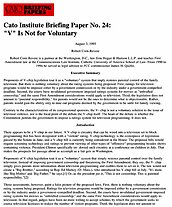Contrary to the characterizations of its congressional sponsors, the V- chip is not a voluntary solution to the issue of televised violence, nor is the focal point of the debate the V‑chip itself. The heart of the debate is whether the Constitution permits the government to impose a ratings system for television programming. It does not.
“V” Is Not for Voluntary
Proponents of V‑chip legislation tout it as a “voluntary” system that imply restores parental control of the family television. But there is nothing voluntary about the rating systems being proposed. First, ratings for television programs would be imposed either by a government commission or by the industry under a government-compelled deadline. Second, the courts have invalidated government-imposed ratings systems for movies as “unbridled censorship,” and the same First Amendment considerations would apply to television. Third, the legislation does not amount to “parental responsibility,” for parents would not be the ones to determine what is objectionable. Rather, parents would gain the ability only to tune out programs deemed by the government to be unfit for family viewing.

This work is licensed under a Creative Commons Attribution-NonCommercial-ShareAlike 4.0 International License.

